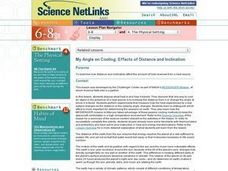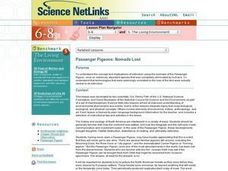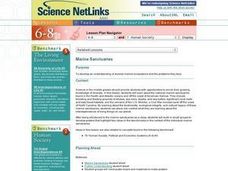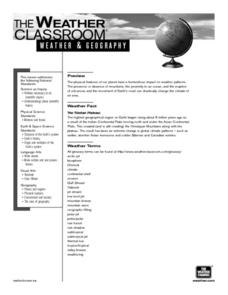Curated OER
Make a Mission
Students discuss the terms exploration and technology. They read about the MESSENGER, Mission to Mercury, and answer questions. Next, they design and plan the technology for a space mission using an online interactive activity.
Curated OER
Zipping Through Our Solar System and Beyond
Launch your class on an exploration of the solar system. Learners construct solar system models to scale and get a better understanding of our place in the vast void of space. This is a great way for them to cement their understanding of...
ESL Kid Stuff
Subject Pronouns (I, You, He, She, We, They)
How are you feeling? Language learners practice using subject pronouns with adjectives by responding to questions, engaging in games, and singing songs.
Curated OER
My Angle on Cooling: Effects of Distance and Inclination
Students discuss what heat is and how it travels. They discover that one way to cool an object in the presence of a heat source is to increase the distance from it or change the angle at which it is faced.
Curated OER
Sky Watching
Students explain how our knowledge of the sky has been enhanced by telescopes. They make their own night-sky observations, diagram and describe what they see, and examine pictures taken by telescopes.
Curated OER
Mexican Metal Tooling
Metal work can be a wonderful way to expose learners to Mexican folk art. This resource provides all the necessary steps for creating Mexican metal tooling with your art class. Images, web links, recommended books and products make...
Curated OER
Adolescent Sleep
Students discuss, summarize, and express alternative positions regarding a study on adolescent sleep. They examine arguments for and against changing the school start time for high-school students, based upon the findings of a scientific...
Curated OER
PASSENGER PIGEONS: NOMADS LOST
Middle schoolers explore the concept and implications of extinction using the example of the Passenger Pigeon, once an extremely abundant species that was completely eliminated by humans.
Curated OER
Science NetLinks: Adolescent Sleep
Wake up, sleepy head! High schoolers craft a creative presentation that represents how they feel when they wake up on a school morning. After the presentations, a reading of Academic Sleep Times and Academic Performance launches a...
University of Connecticut
Building Your Own Biosphere
On September 26, 1991, four women and four men entered the scientific experiment, Biosphere 2; the doors were sealed for two years in order to study the interactions of a biosphere. In the activity, scholars explore biospheres by...
Messenger Education
Mission: Possible—How Can We Plan an Exploration of Another World?
An astronaut's spacesuit weighs 280 pounds and takes 45 minutes to put on — that's a serious suit! The second activity of a three-part series allows pupils to see all that goes into space exploration. Through simulations, groups analyze...
Curated OER
Marine Sanctuaries
Students delve into diverse marine ecosystems and the problems they face. They discover students the national marine sanctuaries found in the Pacific and Atlantic oceans and off the coast of American Samoa.
Curated OER
Conservation of Energy
Fifth graders examine their use of energy over a certain time period. They come up with a plan to reduce their energy consumption and carbon footprint. Groups of learners complete a chart with three columns; energy-using events, the form...
Curated OER
Fossil Kit II
Youngsters examine four fossil replicas and chart their time periods, vertebrate or invertebrate, and the names of other organisms living at the same time. A specific fossil kit is available for sale if you do not have the same samples....
Curated OER
Don't Let the Earth Down
Writing a persuasive argument starts with a clear thesis. Using this resource, your class will write a persuasive paper on a conservation issue. They will then transform their argument into a 30-second public service announcement. If...
Curated OER
Don't Let the Earth Down
Although recycling is definitely beneficial, reducing our waste and conserving our natural resources should really be the focus of environmentalists. Encourage the future generation to create a public service announcement about a...
Curated OER
The Tibetan Plateau
Students discuss the characteristics of the biosphere, with a focus on the Tibetan Plateau. They participate in a question and answer period discussing biomes and climate patterns. They compare and contrast different ecosystems.
Curated OER
Using The Opera To Create A Puppet Show
Students become familiar with various types of puppets and then create their own puppets. They use the Verse Play of La Cenerentola and puppets to prepare and conduct a performance.
Curated OER
Sky Watching
Students complete night-sky observations to understand how our knowledge of the sky has been enhanced by telescopes. Students complete a timeline worksheet giving the history of telescopes. Students then then make their own observations...
Curated OER
Garbage Plants
Students create plants out of garbage. They identify items that can be recycled and discuss natural resources. They share their creation with the class.
Curated OER
Behind the Mission to Mercury
Learners read an E-Sheet about the Mission to Mercury. They follow a variety of worksheets and on-line activities that follow the E-Sheet. They discuss several different scenarios regarding space exploration. They analyze one of the...
Curated OER
Too Bright at Night?
Students reflect upon the causes and effects of light pollution in the night skies. First, they read articles provided and then do worksheets that are provided. They work in groups to discuss their conclusions.
Curated OER
Too Bright At Night?
Students explain what causes light pollution and how it can be curtailed. They consider the negative consequences of nighttime lighting, enabled by the invention of electric lights at the close of the 19th Century.
Curated OER
What is Energy?
Youngsters take a look at the foods they eat, and how they provide energy for them to do things. They look at how body uses the food energy to create movement. Pupils also look at toys/devices in the room that need electrical energy...

























